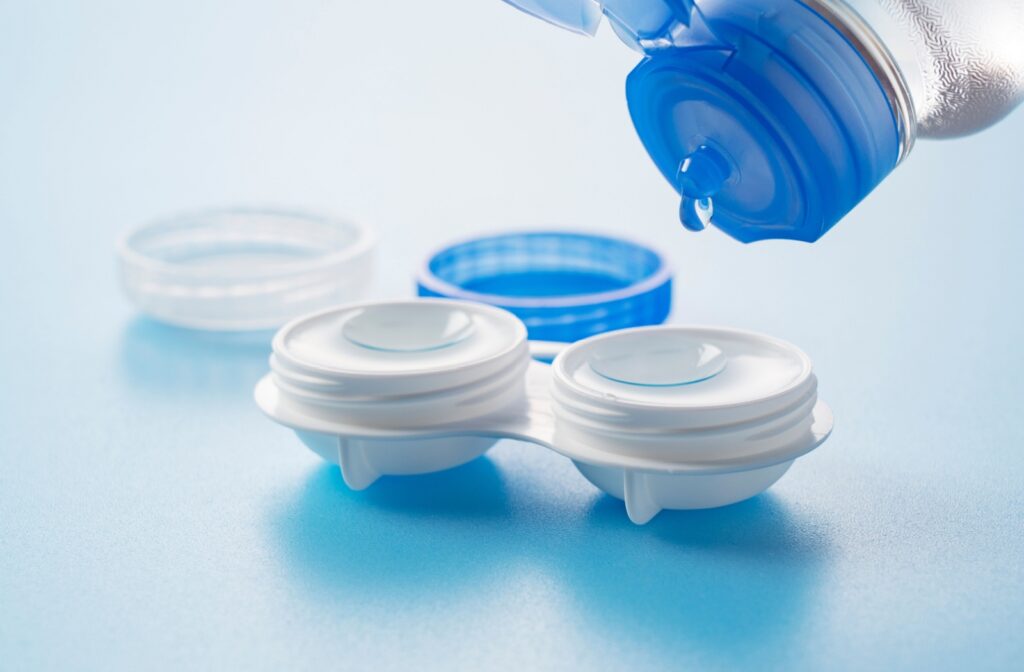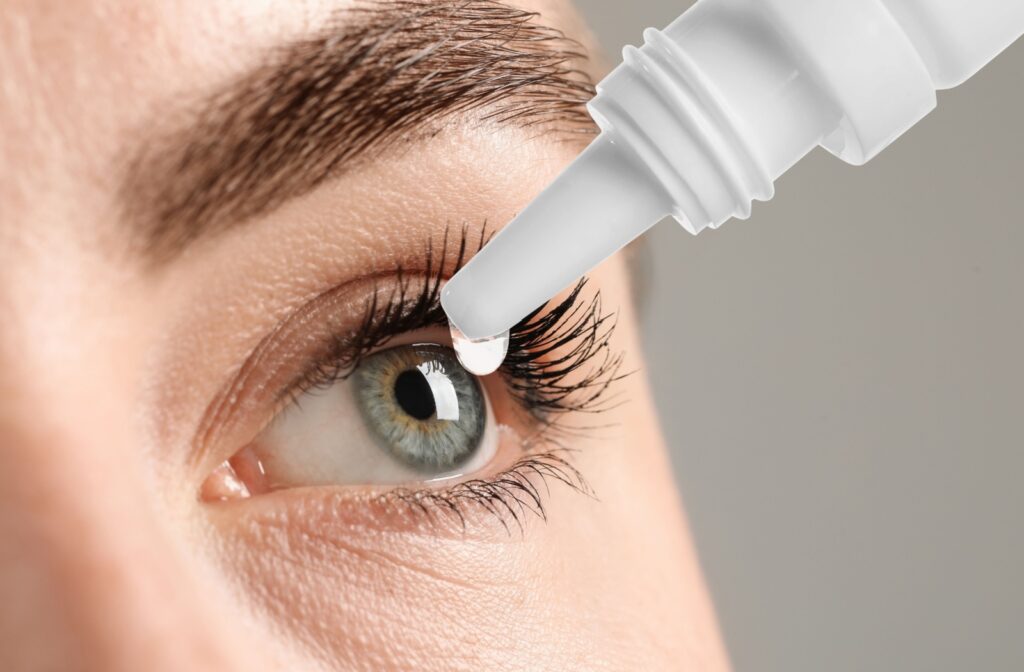Wearing contact lenses can be a comfortable and convenient alternative to glasses, but it’s not without its challenges, especially when dryness and irritation set in. In moments of discomfort, some people consider using contact solution as a quick fix for relief.
But, is it safe to do this? In most cases, no—contact solution isn’t meant to be used directly in your eyes as a substitute for lubricating eye drops. While certain solutions are formulated to be gentle and compatible with the eyes when used properly with contact lenses, they’re not designed to hydrate or soothe your eyes like eye drops are.
Understanding the Differences
While contact solution and eye drops may seem similar at a glance, they serve very different functions in your eye care routine.
Contact solution is formulated to clean, disinfect, and store contact lenses. It breaks down protein deposits and bacteria that build up throughout the day, helping keep lenses comfortable to wear. Multipurpose solutions are designed to be gentle enough for rinsing lenses before insertion, and their ingredients are generally tolerated by the eye when transferred through a cleaned lens.
However, that doesn’t mean these solutions should be used directly in your eyes like artificial tears. Many contact solutions contain preservatives and disinfectants that, while safe for lenses, can cause stinging or irritation if applied directly to the eye’s surface.
Eye drops, on the other hand, are formulated to hydrate, lubricate, and relieve irritation. These drops mimic your natural tears and are gentle enough to be used directly in the eye. Some are designed specifically for use with contacts, while others should only be used without lenses, so always check the label before applying.
Why Contact Solution Isn’t a Replacement for Eye Drops
It’s tempting to reach for the nearest bottle when your eyes feel dry, but using contact solution in place of eye drops may not be the best option.
Even though some contact solutions are milder and compatible with the ocular surface when used properly (such as rinsing lenses before wear), they’re not intended to function as direct-eye lubricants. Doing so may result in stinging or burning sensations, redness, irritation, or blurred vision.
The key issue is that most contact solutions are formulated with a different chemical balance designed to clean and preserve lenses, not moisturize your eyes. This difference in pH, osmolarity, and ingredients can disrupt the eye’s natural tear film if misused.
Why Using the Right Eye Care Products Matters
When it comes to eye health, using the correct product makes all the difference.
Eye drops are available in several targeted formulations: artificial tears for dry eyes, antihistamines for allergy symptoms, or medicated drops for specific conditions like glaucoma or infection. Each type is carefully developed to support the eye.
Professional guidance can help you choose the right solution for your needs. A comprehensive eye exam can uncover the underlying cause of your symptoms, whether it’s seasonal allergies, chronic dryness, or another condition requiring treatment. Routine exams also give your optometrist the opportunity to track subtle changes in your eyes before they develop into more serious issues.
If dryness or irritation has you reaching for a workaround, it’s a good time to check in with your optometrist. Many clinics offer advanced diagnostics and personalized care plans to treat symptoms effectively, especially in cases of chronic dry eye.
For patients with meibomian gland dysfunction, one of the most common causes of dry eye, light-based therapies like intense pulsed light (IPL) have shown promising results. This treatment targets inflammation at the source, helping to restore more natural tear production and comfort over time.

Support for Complex Eye Care Needs
In addition to dry eye treatment, many eye care providers offer support for more complex conditions and advanced visual needs.
Services may include:
- Custom contact lens fittings for conditions like keratoconus, post-corneal transplant healing, or corneal reshaping therapy (CRT)
- Vision therapy and myopia control solutions, such as MiSight, Atropine, and CRT lenses
- Ongoing care for eye diseases like glaucoma or age-related macular degeneration
Not all eyes tolerate standard lenses well, and not all dry eye cases respond to over-the-counter drops. A personalized approach to care is key when it comes to comfort, clarity, and long-term eye health.
Protect Your Vision with the Right Eye Care
Using the right products for your eyes, especially when wearing contact lenses, is essential. While some contact solutions are formulated to be gentle and compatible with the eye, they are not meant to be used as eye drops. If your eyes feel dry or irritated, reach for artificial tears that are safe for your lenses, or better yet, check in with your optometrist for personalized guidance. Our team at The Vision Place is here to help you find comfortable, safe solutions tailored to your needs. Book your comprehensive eye exam with us today to get personalized recommendations and support tailored to your vision and lifestyle. Your eyes will thank you.


